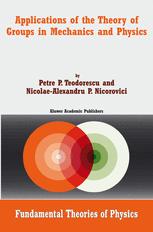

Most ebook files are in PDF format, so you can easily read them using various software such as Foxit Reader or directly on the Google Chrome browser.
Some ebook files are released by publishers in other formats such as .awz, .mobi, .epub, .fb2, etc. You may need to install specific software to read these formats on mobile/PC, such as Calibre.
Please read the tutorial at this link: https://ebookbell.com/faq
We offer FREE conversion to the popular formats you request; however, this may take some time. Therefore, right after payment, please email us, and we will try to provide the service as quickly as possible.
For some exceptional file formats or broken links (if any), please refrain from opening any disputes. Instead, email us first, and we will try to assist within a maximum of 6 hours.
EbookBell Team

4.3
78 reviewsThe notion of group is fundamental in our days, not only in mathematics, but also in classical mechanics, electromagnetism, theory of relativity, quantum mechanics, theory of elementary particles, etc. This notion has developed during a century and this development is connected with the names of great mathematicians as E. Galois, A. L. Cauchy, C. F. Gauss, W. R. Hamilton, C. Jordan, S. Lie, E. Cartan, H. Weyl, E. Wigner, and of many others. In mathematics, as in other sciences, the simple and fertile ideas make their way with difficulty and slowly; however, this long history would have been of a minor interest, had the notion of group remained connected only with rather restricted domains of mathematics, those in which it occurred at the beginning. But at present, groups have invaded almost all mathematical disciplines, mechanics, the largest part of physics, of chemistry, etc. We may say, without exaggeration, that this is the most important idea that occurred in mathematics since the invention of infinitesimal calculus; indeed, the notion of group expresses, in a precise and operational form, the vague and universal ideas of regularity and symmetry. The notion of group led to a profound understanding of the character of the laws which govern natural phenomena, permitting to formulate new laws, correcting certain inadequate formulations and providing unitary and non contradictory formulations for the investigated phenomena.